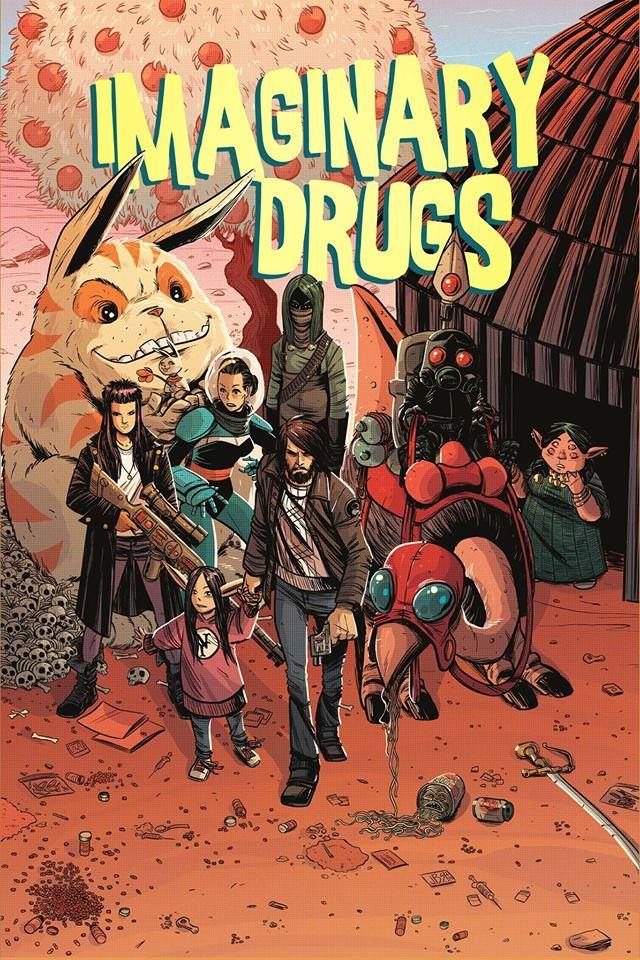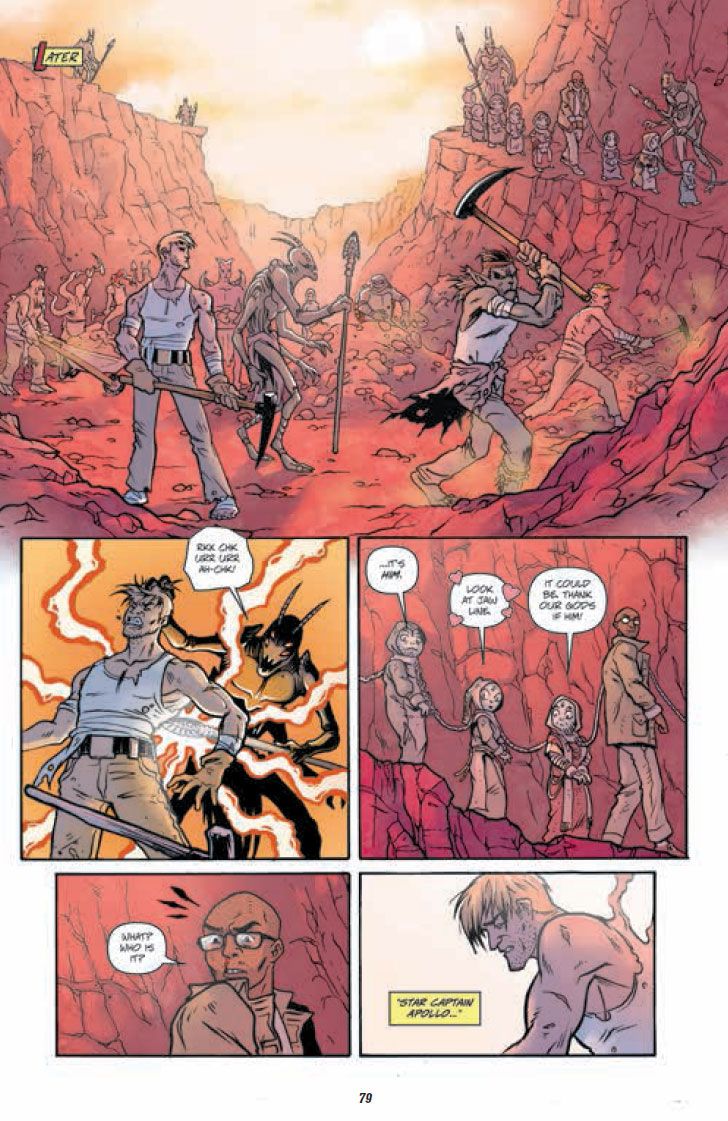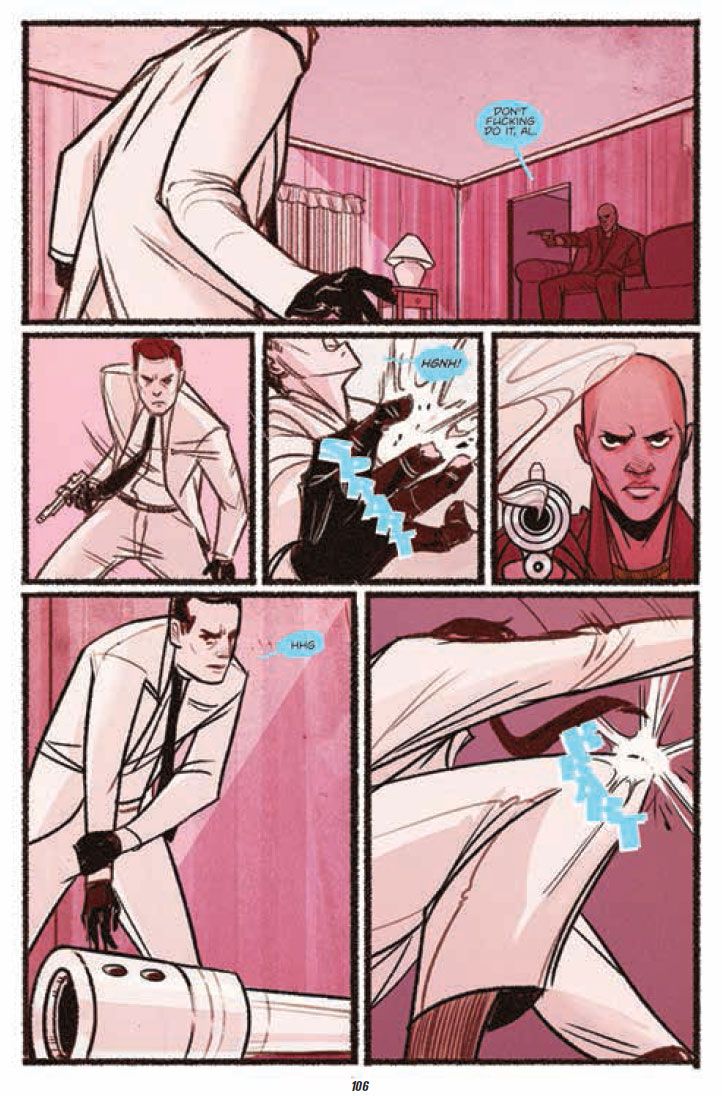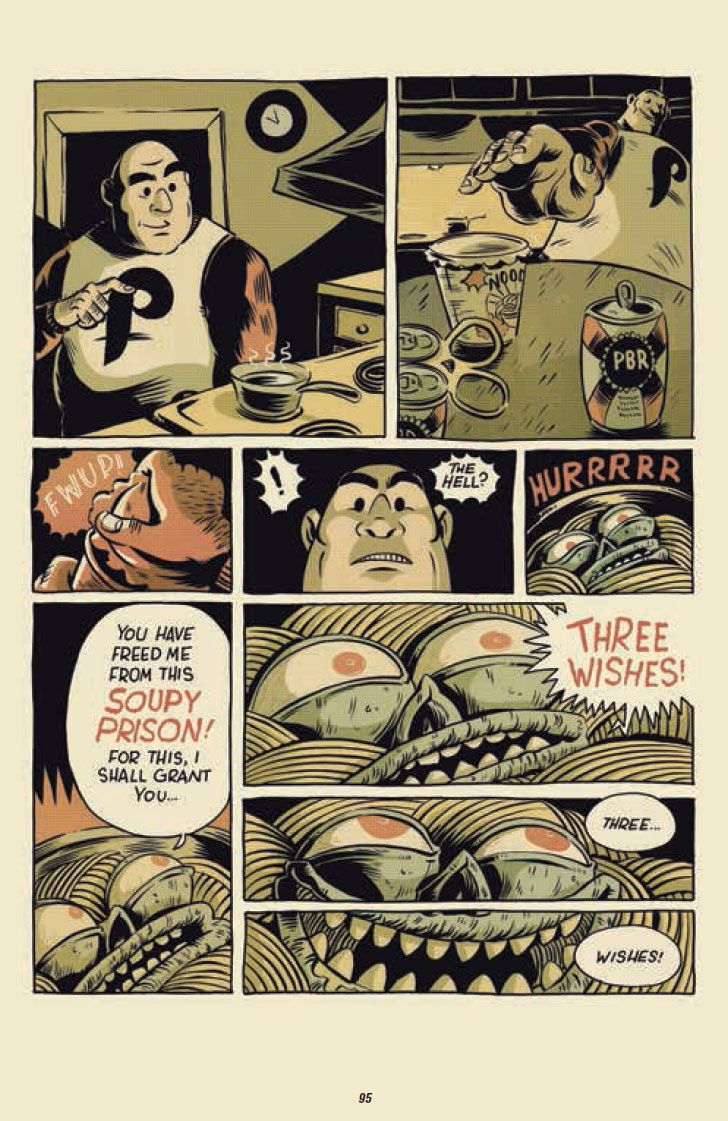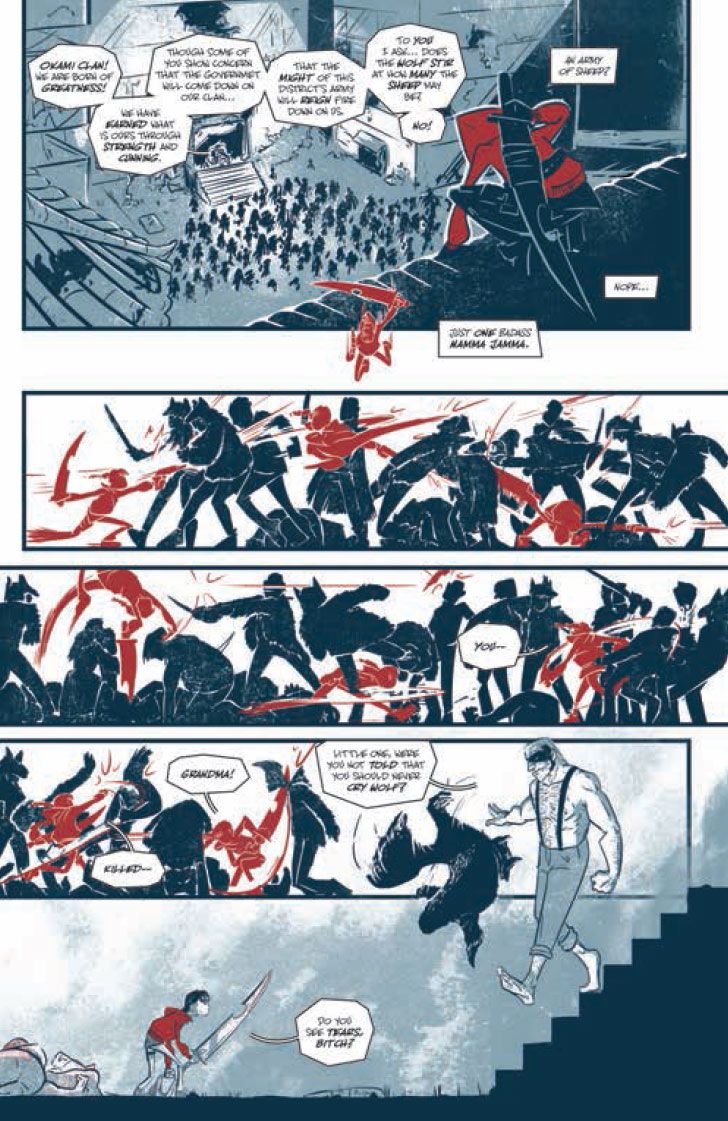Imaginary Drugs is a bit of a success story, even before its release through IDW Publishing.
Edited by Michael McDermott, it began life in late 2013 as a modest (if eclectic) anthology of sci-fi and fantasy stories seeking funding through Kickstarter. But as interest and pledges increased -- the campaign raised nearly triple its goal -- so did the number of pages and indie creators, so that what began as a 56-page comic soon became a 160-page collection.
However, the growth didn't stop there: When McDermott signed a deal to release Imaginary Drugs through IDW, even more creators were brought on board, bringing the edition that arrives Jan. 27 to a whopping 208 pages.
McDermott, who also wrote several of the stories in the anthology, spoke with ROBOT 6 about the genesis of Imaginary Drugs, how he went about recruiting contributors, lessons learned from the Kickstarter campaign, and the benefits of teaming with IDW.
ROBOT 6; What was your original vision for Imaginary Drugs? I’d be hard-pressed to point to a unifying theme for all the stories beyond sci-fi and fantasy, yet they feel as if they belong together.
Michael McDermott: First of all, thank you for saying that. I think there's an invisible binding flow to the anthology as well, but I can't take much credit for that or put my finger on it. The book started as a nebulous collection of edgy, sci-fi, heroic, pop comics in my mind’s eye. I've always had a burning desire to do a book with the soul-kicking spirit of Heavy Metal, and I was raised on corporate comics from before I could read; child of two worlds, me. One of my earliest memories as a kid was sneaking into a collection of sci-fi anthologies of my father's and seeing this brutal, barbaric, beautifully rendered alien imagery ... and giant, naked, hairy space dongs. Probably Frazetta. I was most likely pre-verbal. I tore them to shreds. But I can still see this black-and-white panel in my mind's eye of this bearded, screaming nude lunatic tied to a space rocket. It disturbed me, scarred my brain forever. Whether it ever really existed or not or if it is just a mythic image cobbled together from an infant’s imagination, it's my first memory of comics.
Imaginary Drugs is my attempt to recreate and make some cosmic sense of this brain-scarring, haunting panel of a bearded, screaming nude lunatic tied to a space rocket. The fact that my fellow collaborators were so in tune with my unspoken mission statement leads me to believe that they too have their own brain-scarring versions of proverbial space-dong panels driving their compulsion to create comics. We can smell our own. Imaginary Drugs is littered with my fellow Spiritual Warriors (TM and Copyright Infinity, Alejandro Jodorowsky).
How did you go about recruiting creators to the anthology?
Originally it was going to be a 32-page or so pamphlet with a few shorts by myself and Jonathan Brandon Sawyer. When Jonathan's schedule rightly filled up, I realized I needed more content and had to bring in other creators to fill up the book and make it worth a reader's purchase. I'm honestly blessed through hard work. I'm associated with a ton of fellow burgeoningly brilliant comic creators via my work on the Fubar anthologies, the 215 Ink Ignition anthology, and the online collective of comic makers (not talkers), The Small Press Commandos. I fell in with a group of powerful and underrepresented voices that fucking refuse to not live, breathe and create the comics they want to see exist in this world. Bunch of ego-maniacal masochists shredding their souls in search of an audience, ‘cause ... comics. They inspire me, they drive me. They make me petty and jealous sometimes. They make me want to be better. We share a purpose. I wub dem.
By my count, eight of the 36 stories are written by you. Did you ever consider simply releasing a collection of your own work? Why was an anthology featuring all of these different voices important to you?
Yup. And as I said, that was the original goal. But I needed to draft for strict content and page-count reasons. I do, however, believe I am an amazing judge of talent, and I wanted my stories to be represented alongside voices I respect, dig and enjoy. I reached out to a handful of fellow creators. Two of them got back to me and got on board: Jeff McClelland and Christine Larsen. The anthology really started to take shape once I saw what they were bringing to the table and how I could format it all to make it work. Then came Kickstarter, motivational stretch goals and near-ish goal-tripling success. Once we launched and proved we weren't just talking smack, a lot of the creators I originally reached out to hopped onboard and offered up more stories to drive our campaign and keep momentum and backer support going. Then, when the IDW deal came together, it became a matter of, "Who do you know that deserves a front-of-Previews publishing credit?" and I reached out to them. McClelland drafted some talent. Some talent was ballsy enough to contact me and ask for a spot, script and creative team in hand. It was kismet. I'd like to be able to make a career out of comic booking, but if I wind up the briefest of insignificant blips on the comics continuum radar, I'm quite confident that this book was meant to be made and take great joy and personal satisfaction in knowing I was able to help midwife her into this world.
Where does the title come from?
My brain ... which is plugged into shared idea space, the collective unconscious and our mutual mythic imagination. It just sounds like the kind of title that should be on our shelves in 2015, doesn't it? Future comics. Subversive comics. Underground, damaged art. We may have been robbed of our hoverboards, but we do have Imaginary Drugs. I did my best. I'm just an aging creature of the ‘90s trying to kick the world as I thought it should be into existence through the only impactful means at my disposal ... comics and trying to be generally cool to everyone.
The Kickstarter campaign was incredibly successful, exceeding your original $5,500 goal by more than $8,100. What did you learn from the experience? Do you think you’ll ever launch another Kickstarter campaign?
I was surprised, humbled, grateful and self-servingly justified by our success. It was weird ... cracking into the work for hire comic industry ... I was lucky enough to run into the legendary and very gracious Paul Levitz on the floor at NYCC this year. He took a moment out of his day to chat me up and share some words of wisdom, personal anecdotes and ultimate advice. He told me they, and when you're talking to Paul Levitz "they" means the earthly demigods that built this creative medium, used to say that in order to break into the industry you had to beat your head against a brick wall until you smashed through.Then, they'd see if you had any talent. Nobody is going to come looking for you to work for them unless you bring something to the table that benefits them. Editors are busy doing their jobs and maintaining their schedules. They're herding cats for a living. Even companies that accept previously published submissions ... it's like asking a landscaper who's busting their ass all day to swing by after work and cut your lawn in their "spare" time for free.
Kickstarter is an anti-wall. Kickstarter builds bridges. It connects you directly to an audience interested and confident in your abilities and work. I delude myself into thinking I'm a creative personality and I suffer from a lot of the cliches associated with artsy folk. Even if it's just a result of some romanticized, self-inflicted adherence to a bohemian ideal, I'm much more comfortable and interested in creating comics than the business and distribution end book making, but if you want to get shit done, you have to put on your big-girl panties and do what you gotta do. My biggest regret and most valuable lesson learned from the experience was underestimating the amount of time and work involved in shipping our rewards. Especially when you're working two real-life jobs and continuing to generate new creative material in the few hours you manage to snatch for yourself in a week.
I do plan on launching another Kickstarter campaign for a 40-ish page graphic novella we're about halfway into called Lars of Mars with the amazingly gifted New York-based graffiti and comic artist Anthony Pugh, but I'm going to be using Amazon to ship our books. That's a thing you can do apparently, use Amazon to ship your straight-Kickstarter book rewards, and I plan to take advantage of that for both my own and my backer's peace of mind.
As the campaign succeeded, the anthology grew – from the original 56 pages to 160 pages to 208 pages for the IDW edition. Did you begin to worry that Imaginary Drugs had grown into a bit of a monster? Was there concern, at least at the Kickstarter stage, about mounting printing and shipping expenses?
Probably not as much as there should have been! [Laughs] Another rookie mistake. I didn't realize until way late in the campaign that I should have closed the $10 reward tier for a 56-page book and opened a new tier to reflect and compensate for the added costs associated with increased page counts, shipping weights and rates and the time needed for the freshly drafted creative teams to complete their additional stories. I'm still glad I turned the book into the massive brick of murdered trees she became, though, and would only change the path I chose to arrive at our collective destination not the destination itself. I'm proud of her. I'm proud of the work my Spiritual Warriors brought to the table. I'm proud of the things they had to say and show. She is the book I wanted her to be. She's a brain-scarrer. Some kid is gonna be digging through a longbox one, five, 10 years from now and they are going to find their haunting "I must create comics" hairy space-dong panel in Imaginary Drugs. That was the one true honest goal and motivating factor behind my initiation of her creation. I am utterly convinced of this and will die content and secure in my belief.
How did the deal with IDW Publishing come about? Had your goal always been to find a publisher for the anthology?
A thought occurred to me once we had secured funding for the book but before the campaign had closed: "People seem to be interested in what we're doing; maybe a publisher will be as well." So I emailed the link to our Kickstarter to the usual suspects: Image, IDW, BOOM! ... would have done Dark Horse too but they don't have a digital submission policy and I didn't think mailing a printout of a link to their home office would engender a whole lot of interest. There is one man who wrote me back -- that man was Chris Ryall at IDW, and he did so almost immediately. The guy making big-time decisions at the company that has been publicly raked over the coals on more than one occasion for producing artistically illegitimate, "unreal," licensed comics saw something in this creator-owned, creator-driven collection of short stories he deemed worthy enough to financially back and distribute. And I pretty much shit my pants with glee when he did. I've been chipping away at creating, submitting, pitching and publishing comics for no small chunk of time now, and that response email was the first legit response from an established, validated, professional maker of comics I'd ever received. I'm never going to forget that he was the guy that saw our spark in the deep and distant dark.
What have been the benefits of signing on with IDW?
I've said this publicly in interviews and via social media before, but I went from selling Imaginary Drugs at the bottom of my driveway at Mike's Comic Book Stand to guaranteed access to every retailer on the planet with a Diamond account. The IDW logo lends a legitimizing stamp of quality and content value in the eyes of many a retailer and reader either hesitant to delve into or overwhelmed by the often indiscernible sea of indie and self-published material. It opens doors. It puts you in book stores. It puts you on shelves. It gives you a larger platform from which to shout your relevancy and attract an audience. I'm very grateful to IDW for granting myself and my comrades the opportunity to partner up on this project.
This may be like asking you to pick your favorite child, but are there any stories in Imaginary Drugs that stand out to you?
Yes. Honestly, I don't believe there's one dud in the bunch or I wouldn't have included it in the anthology, but I do have my personal faves in there as a reader and as a fan -- comics that really got me pumped when I read them. There are a probably a literal combined metric ton of unique, innovative and talented writers, artists, colorists and letterers that worked their asses off and broke their creative backs to bring Imaginary Drugs. It's because of them that our shared vision quest has led me to the reality of this interview and our looming commercial release. I will say this, though: As far as format is concerned, Eric Esquivel, Will Perkins, Michael Wiggam and Jeff McClelland produced my single favorite one-page comic I have ever read in my entire life in “Twenty-One.”
What are the odds we’ll see an Imaginary Drugs Vol. 2?
How many copies of Imaginary Drugs Vol. 1 are you planning on buying, Kev? ‘Cause the only thing stopping us is the potential commercial and critical failure of the book you'll soon be holding in your hands or reading on your preferred digitally adept device.


